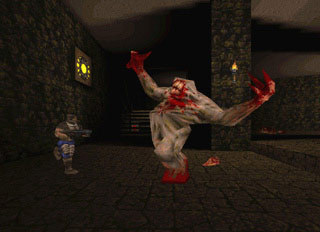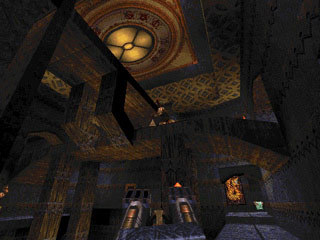Postscript is Cameron Kunzelman's weekly column about endings, apocalypses, deaths, bosses, and all sorts of other finalities.The final boss of 1996's Quake is a heaving mass of flesh. Her name is Shub-Niggurath, a reference to an elder god from the fiction of H.P. Lovecraft, and she seems to be invincible. I remember playing the game sometime after its release in that weird, wild world of 1990s shooter games, and I could never crack it. The enemy was invincible, unkillable as far as I could tell. She seemed to be the end of all things.Years later, I realized how the boss fight works. You travel through passages, killing some of the most difficult enemies in the game, and you make your way to a teleporter. That teleporter's outlet is a little spiky ball; when you walk through it, you pop into existence at the location of the ball.
Quake intends for the player to carefully watch that spiky ball as it moves around and through Shub-Niggurath. When it is inside of her, you hop into the teleporter. While those early 3D graphics don't necessarily convey it super well, the implication is that the player character has teleported into her body, and the game's victory text scrolls over a short animation of the elder god distorting and writhing until the player explodes out of her in a rain of bloody chunks.As a teen, I never got there. My love of Quake was short-lived, and I spent more time than one would believe shooting rockets, nails, and shotgun pellets at this big triangle monster living in the center of a lava pit. Albert Camus said that we have to imagine Sisyphus, the Greek man doomed to roll a rock up a hill for eternity, as happy. The very absurdity of his task gives him purpose. Teen me could not be imagined as happy. Teen me was just super pissed off. I moved onto other things.I think back on that experience often. For me, at that moment, Quake ended at a wall. As I perceived it—in my lack of curiosity and puzzle-solving skills—the game had led me through multiple dimensions of pain and violence only to bring me to a place that I could not proceed from. Imagine it from my perspective: I played for hours, died innumerable times, collected all of these damned fragments of whatever, and then I reached a place from which there was no escape. There was a sheer, towering wall, and I stood before it unable to go anywhere. I've written about this sort of phenomenon before. For me, Overwatch has taken on that feeling. I had similar moments with Fallout 2 and the Legion expansion for World of Warcraft. I have a fascination and a feeling of utter hopelessness when I am faced with a challenge that (seemingly) cannot be surmounted except through extraordinary means.Despite feeling unhappy about it, I also think there's some value in true hopelessness in video game design. The idea that Shub-Niggurath could be an enemy that is undefeatable is the kind of enraging, unfair situation that might produce great results.I'm thinking about this in the context of many games that seem to work on a meritocratic idea. This idea appears in many different ways. There is the classic leveling system in the mode of Final Fantasy that converts your time (the literal time that the player spends in the game) to progression. There is also a slightly newer, but somehow more classic, idea that players gaining knowledge is the real value to be gained from repeated actions in games. Response prediction and programmatic ideas of what would should do in certain situations has been recently revealed as the "true" form of mastery in games, from roguelikes to Dark Souls to open-world survival games.The idea that a player should meld themselves seamlessly into the problem solving of a given game that they are dedicated to is appealing from a number of perspectives. On the development side, it lets the creators of games create multiple systems that all interlock and reward players for their understanding. On the players' end, it actually rewards them for sinking dozens or hundreds of hours into a game like Spelunky.
I've written about this sort of phenomenon before. For me, Overwatch has taken on that feeling. I had similar moments with Fallout 2 and the Legion expansion for World of Warcraft. I have a fascination and a feeling of utter hopelessness when I am faced with a challenge that (seemingly) cannot be surmounted except through extraordinary means.Despite feeling unhappy about it, I also think there's some value in true hopelessness in video game design. The idea that Shub-Niggurath could be an enemy that is undefeatable is the kind of enraging, unfair situation that might produce great results.I'm thinking about this in the context of many games that seem to work on a meritocratic idea. This idea appears in many different ways. There is the classic leveling system in the mode of Final Fantasy that converts your time (the literal time that the player spends in the game) to progression. There is also a slightly newer, but somehow more classic, idea that players gaining knowledge is the real value to be gained from repeated actions in games. Response prediction and programmatic ideas of what would should do in certain situations has been recently revealed as the "true" form of mastery in games, from roguelikes to Dark Souls to open-world survival games.The idea that a player should meld themselves seamlessly into the problem solving of a given game that they are dedicated to is appealing from a number of perspectives. On the development side, it lets the creators of games create multiple systems that all interlock and reward players for their understanding. On the players' end, it actually rewards them for sinking dozens or hundreds of hours into a game like Spelunky. If you know exactly how to kill that game's angry shopkeeper (and you know how to avoid him throughout the rest of the game), then all of those hours spent dying at his shotgun-wielding hands begin to soften the blow of all those sunk hours. You didn't waste your time; you learned how to play the game well, on an instinctual level, and everyone who is unhappy with the game should just put those hours in.
If you know exactly how to kill that game's angry shopkeeper (and you know how to avoid him throughout the rest of the game), then all of those hours spent dying at his shotgun-wielding hands begin to soften the blow of all those sunk hours. You didn't waste your time; you learned how to play the game well, on an instinctual level, and everyone who is unhappy with the game should just put those hours in.
Advertisement
Advertisement

Advertisement

I don't think that perspective is wrong, but I do think that is demonstrates a need for "hard games." Not games that are difficult, but games that do not do the work to make sure that you are comforted or brought into the narrative or skill-based fold. I want to see games like my teenage version of Quake: Games that cannot be beaten simply because they cannot be beaten. No matter how much you work, build skill, or try to make them manageable, they never cohere into a winning state or narrative pleasure. These would be games that cannot imagine a meritocratic victory, neither by shaping the player into the appropriate mold or by generating levels of numeric mastery. Instead, they merely turn the player into a gaming Tantalus who is never able to fulfill their desires of mastery or completion.You can simulate this, of course. Go buy Quake. Play through the entire game. Get to the final level. Shoot the final enemy, that fleshy monster, with all of your ammunition. Jump into the lava. Never play it again.No matter how much you work, build skill, or try to make them manageable, they never cohere into a winning state or narrative pleasure.
